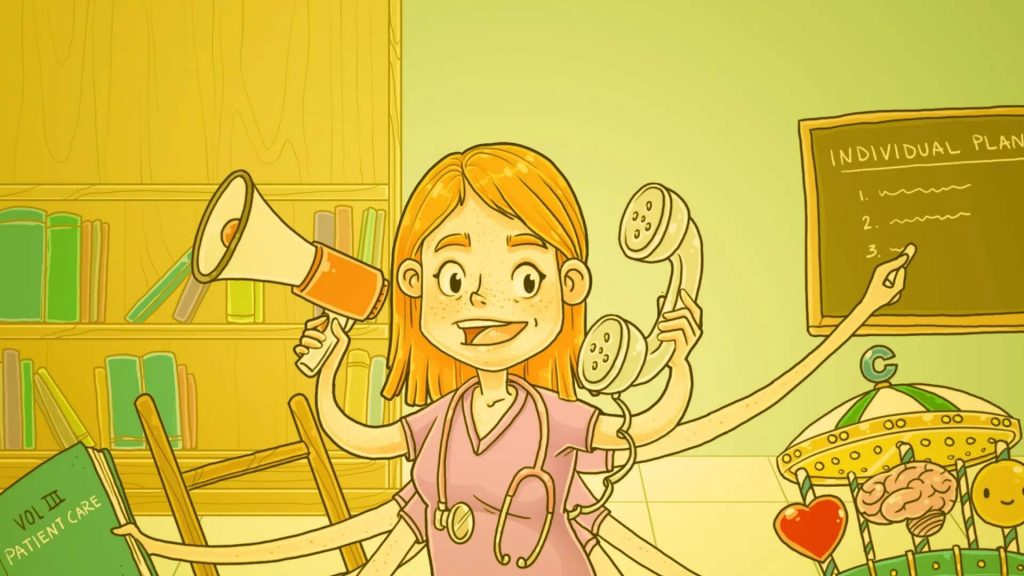Chances are you’ve seen more than a couple of medical dramas or movies before deciding to enroll in nursing school. (Yeah, we’re Grey’s Anatomy fans too!) So, you have a picture in your mind of what nursing school is like; ruthless, too difficult to finish, and full of insanely good-looking people who never see their family. Are these all true? Or are they just nursing school myths?

Well, we don’t think nursing school is easy. Of course, there’s one thing that will always stay true: If you want to pass the NCLEX® (The National Council Licensure Examination), you have to study.
Picmonic is a great visual study aid that teaches you with nursing mnemonics that you will actually remember come test day that follows along with your nursing program curriculum. This way, learning feels more like a fun game than a tedious thing you have to do between eating, sleeping, clinicals, and class.
Myth 1: Say Goodbye to Your Friends and Family
If you go a week without seeing your favorite people because of school, something is wrong. Is it that nursing just isn’t your passion, so the work seems torturous and you end up procrastinating? Or is that your study habits are terrible? Find out what’s really causing the lack of time. If nursing isn’t your passion, that’s okay! That happens! There’s a lot you can do within the medical field, you don’t have to be a nurse. Even further, there’s a lot you can do as a nurse that is not what traditional nursing looks like. With a nursing degree, you can go into many areas; education, public health, administration…the list goes on. Don’t think you have to be pigeon-holed into bedside nursing.
However, if you’re finding it difficult to study, or studying a lot but still doing poorly on nursing tests, it’s time to dig deeper and examine the way you learn.
Myth 2: You’ll Just End Up Working in a Hospital
Remember the school nurse from elementary school who gave you an ice pack when you fell off the swings? What about the kind nurse who took your temperature at the doctor’s office as a kid?
The truth is, there are a ton of places nurses can work after they’ve passed the NCLEX® nursing exam, such as schools, clinics or even in a private home, and if you find you love one specialty over another, you can always go back to school to become certified in it. Just like we mentioned above, being a nurse opens lots of doors for you professionally, so don’t box yourself into one idea just because that’s “what you heard.”

Myth 3: Just Get Your Degree, Then You’re Automatically a Nursing Genius!
Is nursing school hard? Yes, it takes a lot of hard work and studying to get your nursing degree and pass the NCLEX® nursing exam, however, just because you’re done with school doesn’t mean you stop learning. Nursing is a science, and science is constantly updating rules, regulations, procedures, and information so something you learn your first month of school may not even be correct by the end of your first semester.
Don’t be afraid to learn a new technique or fact that can help you be the best nurse possible even years after you’re finished with nursing school. As science is progressing, and as new research and regulations emerge, your nursing practice will have to adapt as well.
Myth 4: Nursing School Wants You To Fail
It seems silly, right? The school you paid to get into wants to see you fail so you can’t graduate or help people live healthier lives? Yes, the nursing tests are hard, the nursing programs are hard -sometimes really hard- but it’s just preparing you to get thick skin so you can take on real-life out there in the field. If you can take on nursing school, think about how much stronger you will be at the end of the game.
Myth 5: You’re Never Going to Make Money as a Nurse
Nurses are laughing at this nursing school myth all the way to the bank. Nurses actually make good money. Some nursing professions, like nurse researchers, even make between $105 and 130k annually. While the median pay for most nurses is roughly $70k per year, that’s still a nice paycheck to take home, so don’t let someone fool you into thinking it’s not. Nurses are paid well because they work hard and they deserve to take home a paycheck that reflects that. Not only that, travel nursing contracts will sometimes add in bonuses, especially during times of public health crisis when nurses are in huge demand.
Now that you know these nursing school myths are just myths, nursing school should be easy, right? Well, kind of. Nursing school will still take work, but let Picmonic for Nursing be your favorite study guide. Picmonic can help you learn better every day with mnemonic visual study aids that help you retain more information in less time with fun stories and characters that boost retention up to 331%!
Fact or Bad Rap: Is Nursing School Hard?
While plenty of people might want to scare you into thinking nursing school is really that bad, the truth is, it’s only difficult if you don’t make the effort to learn, study, and prepare for what’s next. Nursing school is what you make of it, so as long as you give it all you’ve got, it won’t be as hard as everyone says.

Answering More Questions and Myth Busters
Never fear, if there are more questions you have about the myths floating around about nursing school, we’ve got the answers.
Why is nursing school so hard?
Nursing school definitely isn’t easy, but it’s not the biggest hurdle in the world either. Nursing school exams are challenging, and the workload can be heavy, but it’s not impossible to pass and keep organized. It definitely may be a bit of a learning curve at first, but nursing school gets easier once you learn how to study, make use of your time, and answer NCLEX-like questions to the best of your ability.
What is the hardest part of nursing school?
The hardest part of nursing school is learning how to manage your time wisely between learning, studying, exam-taking, and self-care. You may feel inclined to sacrifice basic needs such as sleep to keep moving along, but to ease stress, learn effectively, and stay motivated, create a routine that works for you and make time for things that make you happy outside of school.
Can nursing school be fun?
Why of course it can be fun! If you enjoy learning and are truly passionate about becoming a nurse, no day in nursing school will be boring. Through engaging classes, meeting your peers, and being supported and challenged by your instructors, you’ll gain critical thinking skills and nursing technical skills all while having the time of your life.
How can I make the most out of my nursing school experience?
Make the most of your nursing school experience by creating a study plan and getting organized. List your upcoming exams in a planner, find the study method that works best for you, and don’t be afraid to reach out to your peers for study groups, clubs, or just to hang out. You don’t have to dedicate every second of every day to learning.
Is it common to fail nursing school?
It’s not as common as you think. Nursing school is worth it, and you may hear that plenty of people drop out, but that’s simply not true. Look up your nursing school’s retention rates to see how many students make it—it’s most likely in the 80 to 90% range.
What percentage of nursing students quit?
Students can drop out for plenty of reasons, whether they be personal or external, don’t let the misconception that lots of students quit scare you away from following your dreams. On average, 20% of nursing students drop out of nursing school, according to the National League of Nursing. A majority of students pass nursing school, and the National League for Nursing Accrediting Commission set the desirable retention rate at 80%.
What is the hardest nursing class?
The answer varies from nursing student to nursing student, but in general, the hardest nursing classes are the following:
- Pharmacology: Ah, the study of medication! There’s a lot to learn in a pharmacology course. Nurses must not only know medication names, but they must remember side effects, drug interactions, how to administer them (aka medication administration), why they are used, and more. Luckily, we have a blog on how to study for your pharmacology course.
- Anatomy: Anatomy focuses on all the body parts from ligaments to bones to muscles—you name it! With lots to memorize, anatomy proves to be a difficult course for most nursing school students. Visual mnemonics can be helpful when trying to study for your anatomy course and learn everything you need to pass.
- Microbiology: Time to study bacteria, fungi, algae, viruses, and tons more tiny organisms. You’ll understand why certain labs are crucial in healthcare after taking this class, and how to treat patients with infectious diseases. Plus, you’ll get hands-on experience in the lab portion of your microbiology class.
Remember, just because these classes are “hard”, doesn’t mean that they’re impossible to pass. Use your tried and true study methods, use flashcards, and take some practice exams before you have that big test. The best way to prevent failure is to prepare for success!
Which semester of nursing school is the hardest?
Again, the answer varies from student to student for this one too. Some say their first semester was difficult as they began learning how nursing school works, but they eventually got the hang of it. Your semester may vary in difficulty depending if you’re in a PLN, BSN, or ADN program, if you’re doing clinical hours, if you’re working, on the number of classes you’re taking, or on your teachers. But, you’ll have easier semesters too! You can read how to prepare for the first semester of your nursing program, but if you’re having a tough semester, hang in there. One hard semester does not reflect your ability to pass nursing school. We’re rooting for you.
Download our mobile app and take Picmonic on the go!


Marlee Liberman, RN, Master Nursing Scholar
As a registered nurse, Marlee understands the struggles that nursing school throws at you – not to mention the overwhelming pressure preparing for the NCLEX®! Marlee brings a unique skill set and perspective to Picmonic with her previous degree in broadcast journalism, her creativity in video production, and her wandering nomad lifestyle. Her blend of talents provides her with the knack for simplifying complicated concepts and demystifying the world of nursing.














